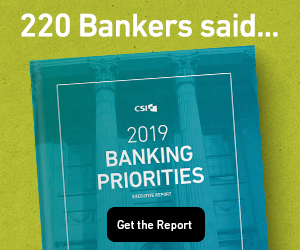|
This ABA Banking Journal newsletter is a free, twice-monthly supplement to the ABA Banking Journal magazine intended to help you stay on top of industry and policy news.
You can also stay abreast of banking news by visiting aba.com/BankingJournal, home to ABA Daily Newsbytes stories, digital exclusives, the ABA Banking Journal Podcast and more.
All 35 bank-holding companies subject to annual Dodd-Frank Act Stress Tests proved that they held enough capital and developed sufficient plans to weather hypothetical financial shocks and recessions modeled by the Fed, the central bank announced this week. (The Hill)
|
With commercial real estate lending a continued area of competitive advantage for community banks, some lenders are finding their team could use a performance boost. Building bench strength in commercial real estate is an important goal, and institutions have several options to increase their internal expertise. (ABA Banking Journal)
|
Despite this week's dip in the market, stoked by on-and-off talk of trade wars, market fundamentals are still strong and the time could be right for investors to get back into equities say analysts.(CNBC)
|
A lawyer and a professional baseball player walk into a bank ... no, it’s not a joke — it’s the latest episode of the ABA Banking Journal Podcast. Hear how a law school grad and a former minor-league baseball player ended up building successful careers in community banking, along with their take on challenges facing community bankers as industry consolidation continues. (ABA Banking Journal)
|
Economic growth will hit 2.8 percent for 2018, the fastest rate of growth in the current expansion, the ABA Economic Advisory Committee says. The committee is forecasting growth to continue into 2020; after June 2019, it would become the longest post-World War II U.S. expansion on record. (ABA Banking Journal)
|
For banks ramping up their focus on small businesses, it can be difficult to assess exactly who the small business customer is. In the fourth quarter of 2016, the number of entrepreneurs who started their own businesses hit a four-year high and economists have calculated that 94 percent of all jobs created between 2005 and 2015 were some form of "alternative," impermanent opportunities. (PYMNTS.com)
|
Just months after receiving a legal rebuke for its efforts to loosen field-of-membership limitations on federal credit unions, the National Credit Union Administration today issued a final rule that makes it easier for credit unions to evade these limits. Specifically, the final rule allows FCUs to use a "narrative" to apply for expansion of a community charter rather than relying on statistical benchmarks. (ABA Banking Journal)
|
President Trump signed into law an ABA-backed bill to strengthen the Small Business Administration’s oversight of its loan programs and increase maximum lending authority. The bill passed the House in May and was approved by the Senate earlier this month. (ABA Banking Journal)
|
The Senate Appropriations Committee has tabled an amendment that would have shielded financial institutions that open accounts for cannabis businesses that are complying with state laws from being punished by federal regulatory authorities. (Forbes)
|
President Trump has chosen Kathy Kraninger, an associate director at the White House Office of Management and Budget (OMB) to lead the Consumer Financial Protection Bureau (CFPB), praising her as a steady hand with ample government experience to "clean up" the agency, which has long been a target of President Trump and congressional Republicans. (The Hill)
|
A federal judge today ruled that the Consumer Financial Protection Bureau’s structure — a single powerful director who cannot be removed at will by the president — is unconstitutional. In her decision, Judge Loretta Preska forbade the CFPB from pursuing its lawsuit against New Jersey-based RD Legal Funding. (ABA Banking Journal)
|
A group of 103 lawmakers wrote to Attorney General Jeff Sessions this week seeking further clarity on how the Americans with Disabilities Act applies to websites. The letter came in response to numerous demand letters that banks and other businesses have received from plaintiffs’ firms asserting that websites are not accessible to speech and hearing impaired customers, as required by ADA. (ABA Banking Journal)
|
|








